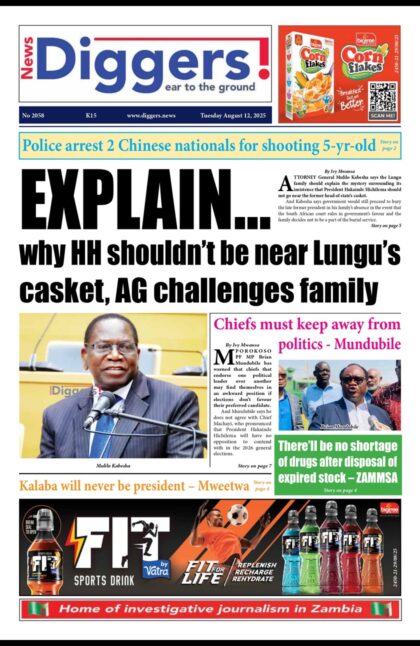Minister of Energy Mathew Nkhuwa has said the expected electricity tariff hike will not spare anyone as mining companies and other industries are equally expected to “pay their bit” or shut down.
But Chamber of Mines president Goodwell Mateyo has urged the government to first consider concluding their promised Cost of Service study before any hiked electricity tariffs were implemented.
Meanwhile, Nkhuwa says the 75 per cent power tariff increment last effected in 2017 was insufficient to make Zambia’s electricity sub-sector cost reflective due to the kwacha’s depreciation.
He said in Parliament, Wednesday, that Zambia had a serious energy crisis and a power tariff hike was the only option to save the country’s economy from collapsing.
“This tariff hike will apply across the board, big companies, mining companies…everybody will pay their bit! They have got a choice: if they don’t want to pay for the power, they can shut off. So, everybody will pay! There is a crisis; we expect the people to come to the party and resolve the crisis we got,” Nkhuwa insisted.
However, Mateyo has warned that the anticipated 75 per cent increment will cripple the mining sector, hence the need to finalize the study.
“75 per cent increment to the mining industry will be crippling, but what we have stated and we have encouraged the Ministry of Energy is to finalize the Cost of Service study so that any increase in electricity tariffs are informed by an independent study indicating what the cost of providing this power and service would be. So, I think that would be our position,” Mateyo said in an interview in Lusaka, Thursday.
“We understand that we were informed that this study will be finalized by this year, and we would like that the study is completed and concluded before the tariff increase is put in effect…”
He said the government had not yet consulted the Chamber on the imminent electricity tariff hike as one of the key stakeholders in the economy.
“At the moment, we have heard the statement by the Minister (Nkhuwa), but we have not yet been communicated to about the proposed price increment and how that might look like,” said Mateyo.
Meanwhile, Nkhuwa told Parliament that the kwacha’s depreciation had negatively affected the 75 per cent tariff hike effected in 2017.
He said this in response to a question from Monze Central UPND member of parliament Jack Mwiimbu, who wanted to know why the government was proposing another 75 per cent hike in tariffs when a similar increment was effected in 2017 to facilitate the importation of power.
“We would like to import 300 megawatts of power from Eskom of South Africa at definitely a cost higher than what we generate from here in Zambia. And we have to pass that cost on the consumers that are going to consume that power. The question is that we increased by 75 per cent last time in 2017; I must say the kwacha has been devalued much more than where we were,” Nkhuwa responded.
“So, when you look at the kwacha today, we are K13.35 to a United States dollar so meaning now, the increase that we had put on has been eroded by exchange losses. Therefore, it is like there was no increase at all, if you go into dollar terms, we are back to square one. So, it is necessary that this is passed on because the price of electricity has to be met by consumers.”
He also confirmed that Zambia was still exporting power to Malawi despite its own power deficit.
This was in response to a question from Mumbwa UPND member of parliament Credo Nanjuwa who wanted to find out if the country was still exporting power to any neighbouring countries.
“The answer is yes! We are exporting to Malawi. We signed, I think last year, and it is a 20 megawatt contract. But due to constraints on their side, they are only drawing 12 megawatts. The House may wish to know that we are also drawing power from Malawi, for example, in Lundazi. From time immemorial, we have been drawing power from Malawi. So, we are giving them power at Mchinji and they are giving us power this way. So, we are selling to them and they are selling to us, and at the end of the day, we are netting off,” Nkhuwa said.
“So, we also receive power until such a time the Chipata transmission line is complete, that is the time we are going to have power in Lundazi. But for now, the people of Lundazi do import power. And even Eskom of South Africa, they have challenges of electricity…have got power shortages but as neighbours, they decided that they can share a little that they have and I think it is good living when you can share with your neighbours when they are in need.”
























